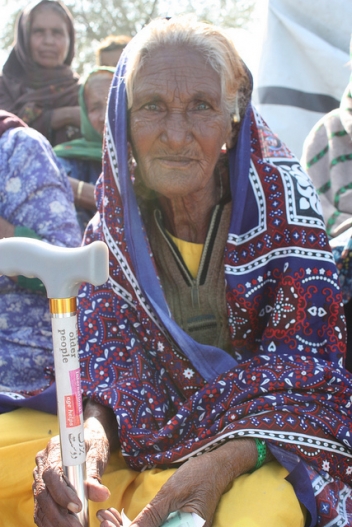“If young women’s lives and children’s lives are important, why not an older woman’s?”
 I’m always highly cynical of when people write or talk about their “awakening” moment, their “a-ha moment”.
I’m always highly cynical of when people write or talk about their “awakening” moment, their “a-ha moment”.
Maybe I’m just envious because I don’t ever seem to have one of those moments. But it happened this week. I think.
Apparently 80% of the older people coming to one of the rural health centres in Nowshera, Pakistan that I visited this week, are older women. This seems remarkable high.
I ask one of the doctors, Dr Wagma, why this is the case.
Older women’s health issues
Dr Wagma said: “Older women come for many reasons. A lot of it we can put down to psycho-social causes, but the symptoms are hypertension, acute respiratory infections, vague general body aches.
“20% of the older women I see are suffering from psycho-social illnesses such as depression. But the other 80% are in real physical need of treatment.
“Most of these illnesses are either directly or indirectly related to post-menopause – arthiritis, osteoporosis, or uterus lapses and vaginal bleeding due to difficult and multiple childbirths.”
What can Dr Wagma do to improve older women’s health?
“Many would benefit from hormone therapies, as well as treatment for depression and hypertension. But these medicines are expensive and cannot be accessed publicly. It can be access privately, but this needs money.
“It also involves seeking permission from her husband for the money to be spent on this.”
“In my opinion”, says Dr Wagma, “every woman in old age is suffering bad health because of reproductive health reasons.
I wish someone focus on older women’s health
“I wish someone out there cared and would focus on older women’s health. If young women’s lives and children’s lives are important, why not an older woman’s? I’m looking at myself in the future when I’m asking this question.”
That was my awakening moment. Why aren’t we doing more on older women’s health?
Why aren’t WHO or UNFPA agencies deeply concerned about this? Maybe they are but we don’t hear about it.
Why don’t our national governments, and international donors take this seriously? Why is the menopause still a bit of a joke, relying on older feminists and writers to draw attention to it?
Does reproductive health exclude post-reproductive women?
If so, is this right?
